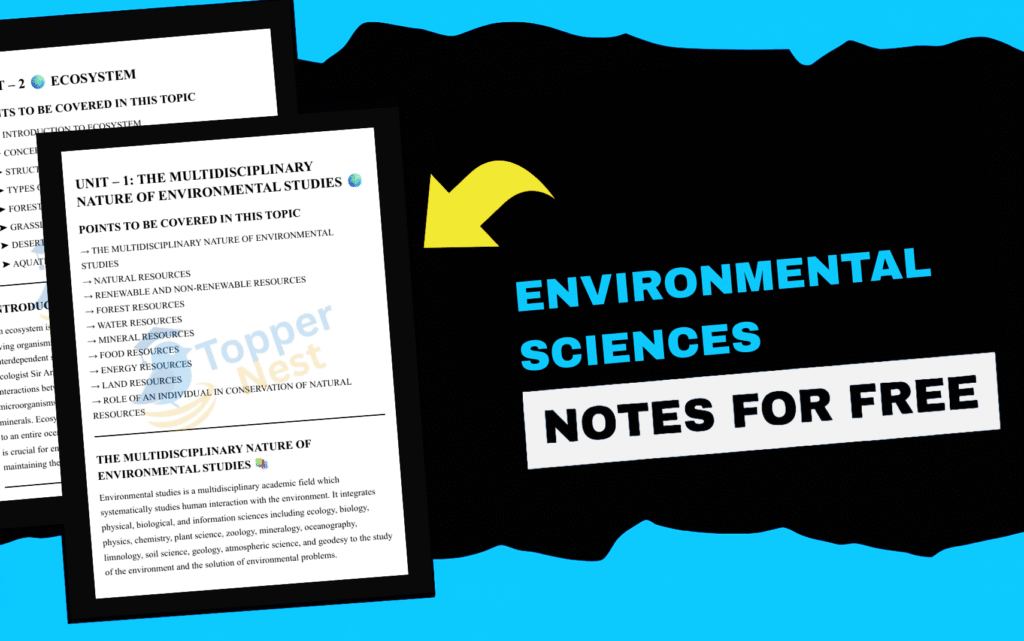Starting your professional course journey? One of the most essential subjects you’ll encounter in your first year is Environmental Sciences. This subject builds your foundation in understanding the environment and its relationship with human health, focusing on ecological balance, pollution control, sustainable development, and environmental protection. It is vital for developing environmental awareness and responsibility among future healthcare and pharmaceutical professionals.
Our Environmental Sciences Notes are carefully prepared to make your study experience simple, well-structured, and exam-focused. Whether you need clear explanations of ecosystems, biodiversity, natural resources, environmental pollution, climate change, waste management, or environmental laws, these notes are designed to help you grasp the concepts thoroughly and retain them effectively.
These notes will not only support your classroom learning but also serve as a quick reference guide before exams. With informative diagrams, step-by-step explanations, key terms, and practical examples, Environmental Sciences Notes make your preparation easier, more efficient, and exam-ready.

What is Environmental Sciences In Pharmacy?
The importance of Computer Applications in Pharmacy in the B. Pharmacy curriculum cannot be overstated, as modern pharmacy is entirely reliant on digital technology. This subject equips future pharmacists with the essential digital literacy and computational skills needed to succeed in a technology-driven healthcare environment.
Here are the key reasons why this subject is crucial:
1. Enhancing Patient Safety and Accuracy
Computer systems are vital for minimizing human error in the dispensing process, which is a core professional responsibility.
- Drug Utilization Review (DUR): Pharmacy software automatically screens every prescription against a patient’s profile to check for potential drug-drug interactions, known allergies, therapeutic duplications, and inappropriate dosing. This instant computational check is far more accurate and faster than manual verification.
- E-Prescribing and Electronic Health Records (EHR): Using digital systems eliminates the risk of errors from handwritten prescriptions, ensures accurate patient histories, and standardizes data, leading to safer and more coordinated care.
- Inventory Control: Accurate, computerized inventory management prevents stock-outs of essential medications and helps track expired or recalled drugs, protecting the public.
2. Streamlining Research and Drug Discovery
In pharmaceutical research and development, computational methods have become indispensable for speed and efficiency.
- Cost and Time Reduction: Computer-Aided Drug Design (CADD) allows researchers to rapidly screen thousands of potential drug molecules in silico (via computer simulation) before expensive and time-consuming laboratory synthesis and testing.
- Modeling and Simulation: Pharmacists involved in research use computer applications to model the absorption, distribution, metabolism, and excretion (ADME) of drugs, helping predict how a drug will behave in the human body.
- Bioinformatics: Specialized software is used to analyze large amounts of genomic and proteomic data, which is essential for developing personalized medicine and understanding drug targets.
3. Improving Professional Efficiency and Compliance
For both hospital and retail pharmacists, computer applications transform day-to-day operations.
- Automation of Tasks: Automated dispensing systems, controlled by specialized software, can count and label medications faster and with higher accuracy than a human, freeing the pharmacist to focus on patient counseling.
- Regulatory Compliance: Computer systems ensure that dispensing practices comply with federal and state regulations, manage billing (especially with insurance and government programs), and maintain detailed, auditable records as required by law.
Unit-wise Notes for Environmental Sciences
| S. No | Unit & Topic |
|---|---|
| 1 | Unit 1 – The Multidisciplinary Nature of Environmental Studies Notes |
| 2 | Unit 2 – Understanding Ecosystems Notes |
| 3 | Unit 3 – Environmental Pollution Notes |
Why Environmental Sciences is Important in B. Pharmacy
Environmental Sciences is important in B. Pharmacy because it connects drug use and pharmaceutical manufacturing to public health and environmental sustainability, ensuring pharmacists are aware of their ecological responsibilities.
1. Understanding Environmental Health and Drug Safety
This subject teaches future pharmacists how environmental factors affect human health and drug efficacy:
- Environmental Causes of Disease: It helps in understanding how environmental hazards (e.g., air pollution, contaminated water, pesticides) contribute to human diseases (like respiratory illness, cancer, or neurological disorders). This context is vital for patient counseling on prevention and risk reduction.
- Drug Metabolism and Toxicity: Exposure to environmental toxins can alter the body’s metabolism and immune response, which in turn can change how a patient processes and responds to medications.
- Contamination and Drug Quality: Pharmacists need to be aware of how environmental conditions (humidity, temperature, light) can impact the stability, efficacy, and safety of pharmaceutical products during storage and distribution.
2. Pharmaceutical Waste Management and Pollution
This is a core area where a pharmacist directly impacts the environment.
- Minimizing Drug Pollution: Pharmacists learn about the proper disposal of unused or expired medications to prevent them from entering the water supply or soil, where they can harm wildlife and potentially affect human health (e.g., endocrine-disrupting chemicals).
- Sustainable Manufacturing: Understanding environmental regulations (like those on water and air quality) is crucial for those who will work in the pharmaceutical industry, guiding them to adopt greener chemistry and more sustainable manufacturing practices.
- Antibiotic Resistance: Environmental Science highlights how the presence of antibiotics in the environment (from improper disposal or agricultural runoff) accelerates the development of antibiotic-resistant bacteria, a massive global health threat.
3. Regulatory Compliance
Knowledge of environmental laws and regulations is necessary for professional practice:
- Pharmacists in industrial or regulatory roles must ensure that the manufacturing, packaging, and waste disposal processes comply with environmental protection standards and laws like the Environmental Protection Act.
